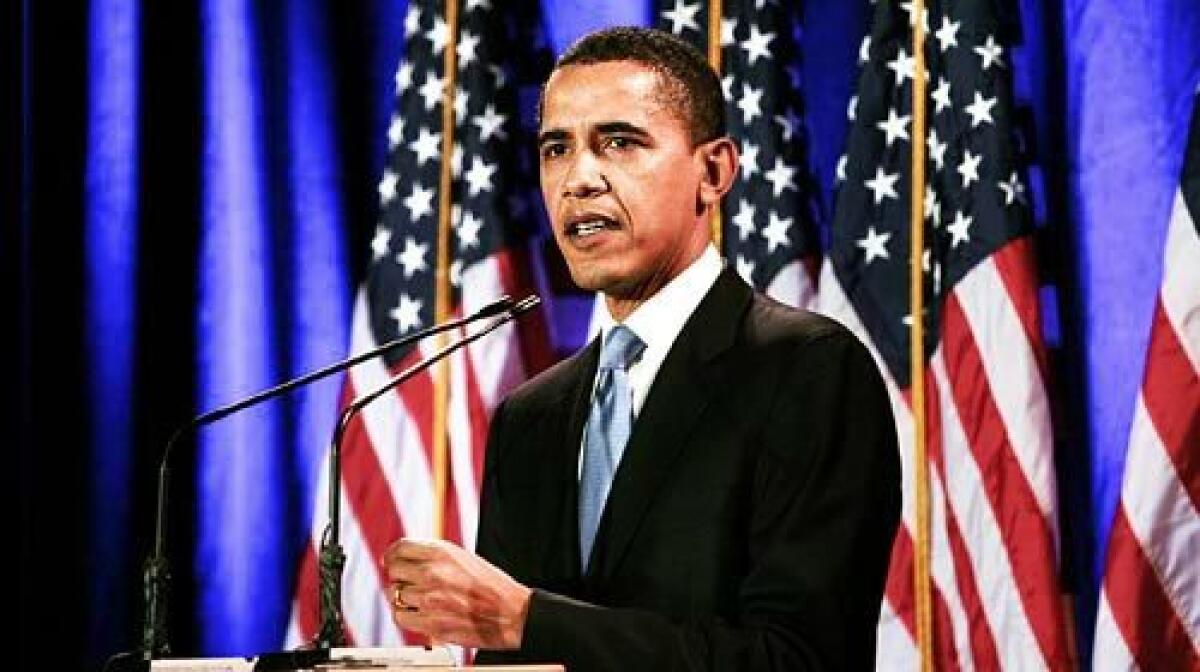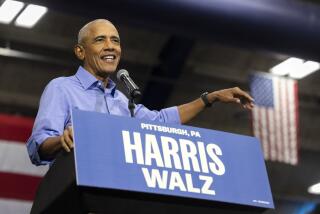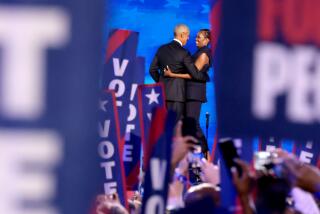Obama stands his unique ground on race

- Share via
PHILADELPHIA — From the earliest days of his career, Barack Obama has sought to assure black voters that a political leader of mixed race, coming from the outpost of Hawaii, could understand the resentments of an African American community shaped by slavery and segregation.
On Tuesday, Obama tried to explain that anger to voters who have been repelled by racially incendiary comments from his longtime pastor.
In a speech widely seen as his most important to date, Obama again denounced the comments by the Rev. Jeremiah A. Wright Jr., which have played continuously on television news shows and threatened to undermine Obama’s campaign theme of uniting a fractured America. At the same time, the Democratic presidential candidate asked voters to understand the frustrations and anger that gave rise to the preacher’s condemnation of America as racist and brutal -- “the U.S. of K.K.K.A.”
“That anger is not always productive. . . . But the anger is real; it is powerful,” Obama said. “And to simply wish it away, to condemn it without understanding its roots, only serves to widen the chasm of misunderstanding that exists between the races.”
While asking all Americans to sympathize with blacks, Obama said he understood the anger that some whites feel over affirmative action or “when they’re told that their fears about crime in urban neighborhoods are somehow prejudiced.”
“It’s a racial stalemate we’ve been stuck in for years. . . . But I have asserted a firm conviction -- a conviction rooted in my faith in God and my faith in the American people -- that working together we can move beyond some of our old racial wounds,” he said.
A rare perspective
Speaking at a museum dedicated to the U.S. Constitution, Obama in effect offered his candidacy as the next chapter in a story of racial tension and reconciliation that has unfolded since the country’s founding. The son of a Kenyan father and a white mother with Kansas roots, he spoke in sweeping terms about his unusual perspective on race, and more than ever elevated it as essential to his White House campaign.
It was a speech that seemed unlikely to come from a politician viewed as simply white or black. Obama rejected the most controversial of Wright’s comments, while saying he could never renounce the man who had helped introduce the senator to Christianity, officiated at his wedding and baptized his children.
“I can no more disown him than I can disown the black community,” Obama said. “I can no more disown him than I can disown my white grandmother -- a woman who helped raise me . . . but a woman who once confessed her fear of black men who passed by her on the street, and who on more than one occasion has uttered racial or ethnic stereotypes that made me cringe.”
He called for Americans to “realize that your dreams do not have to come at the expense of my dreams.”
And then he laid out two choices:
In this political season, he said, “we can tackle race only as spectacle -- as we did in the O.J. trial. . . . We can play Rev. Wright’s sermons on every channel every day, and talk about them from now until the election.”
The alternative, he said, is to “come together and say, ‘Not this time.’ ”
Wright -- who penned the phrase “audacity of hope” that Obama later used as the title of his second book -- became the center of controversy after portions of his sermons were posted on the Internet and shown on television. They included Wright railing against the U.S. government for adopting what he said were racist policies and then wanting blacks to “sing ‘God Bless America.’ No, no, no,” he said. “God damn America.”
After the Sept. 11 attacks, Wright accused the United States of supporting “state terrorism against the Palestinians and black South Africans,” and then being “indignant because the stuff we have done ourselves is now brought right back into our own frontyards.”
It was unclear whether voters who previously thought Wright’s comments reflected badly on Obama would see them in a different light after the candidate’s speech Tuesday. But several analysts said the Illinois senator took a significant step in overcoming what has emerged as the most serious crisis in his campaign.
“It helps to soften the negativity of it,” said Philip Molfese, president of Grainger Terry Inc., a Chicago-based political consulting and crisis communication firm. “And a lot of people will respect the fact that he stood by the man but denounced the comments.”
“In my world, Crisis Management 101, the rule is: Don’t run from the issue. Tackle it head-on,” said Kevin Feeley, president of Bellevue Communications Group, a Philadelphia firm. “He not only tackled it head-on, [but] in the course of distancing himself from the remarks . . . Obama somehow managed to change the issue from a discussion about Rev. Wright to a discussion about race and its impact on all of us in America.”
Others, however, said the tempest would not fade. Some conservatives continued to use the controversy to attack Obama, who has claimed an ability to reach across the political spectrum and has drawn significant numbers of Republican supporters in some Democratic primaries.
“This is a core question of character,” Newt Gingrich, a Republican and former House speaker, said on Fox News. He said that either Obama should have confronted Wright about his comments earlier, “or he didn’t actually mind it as long as it wasn’t public.”
Even before Wright’s words were widely publicized, race had become a polarizing factor in Obama’s contest with Sen. Hillary Rodham Clinton for the Democratic nomination. Initially, blacks were slow to warm to Obama’s candidacy. But once he gained traction among white voters in states such as Iowa, African American voters grew more excited. Now they vote for him in overwhelming numbers.
Early in the primary season, Clinton was criticized for comments that some thought diminished the role of black activists in the civil rights movement. And her husband, former President Bill Clinton, came under fire for appearing to belittle Obama’s appeal across racial lines.
Last week, one top Clinton backer, former vice presidential candidate Geraldine A. Ferraro, suggested that Obama was succeeding because he was black.
Aware of the challenge
Obama’s association with Wright has challenged the campaign from the start. The pastor had been scheduled to deliver an invocation at Obama’s official campaign announcement in March 2007 but was abruptly removed from the program -- a change that campaign aides acknowledged this week was made in anticipation of the controversy that would surely surround him.
Writing on the Huffington Post website last week and in interviews with Chicago newspapers, Obama had said that when he sat in the pews at Trinity United Church of Christ, he had not heard Wright make some of his more controversial statements.
On Tuesday, saying “nagging questions” remain for some voters, Obama offered a different account.
“Did I know him to be an occasionally fierce critic of American domestic and foreign policy? Of course. Did I ever hear him make remarks that could be considered controversial while I sat in church? Yes,” Obama said.
“Did I strongly disagree with many of his political views? Absolutely -- just as I’m sure many of you have heard remarks from your pastors, priests or rabbis with which you strongly disagreed.”
With his speech, Obama tried to pull off an unusual balancing act, reassuring white voters who may have felt threatened by Wright while convincing blacks that he was not abandoning an outspoken leader in their community.
“If he had, he would have shamed us. Shamed blacks. Been just another politician, making promises and lying about his past to get ahead,” said Tyrone Wallace, 42, a single father who works in construction and watched the speech from a relative’s home near Wright’s Chicago church. “I thank the good Lord that he didn’t shun him.”
Obama said Wright’s anger stemmed from his experience in an earlier, segregated era that many today might not understand. But he also said his longtime spiritual advisor had made a “profound mistake” in preaching at times “as if our society was static, as if no progress has been made.”
Times staff writer P.J. Huffstutter in Chicago contributed to this report.
More to Read
Sign up for Essential California
The most important California stories and recommendations in your inbox every morning.
You may occasionally receive promotional content from the Los Angeles Times.










